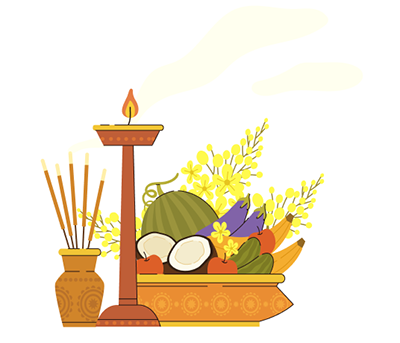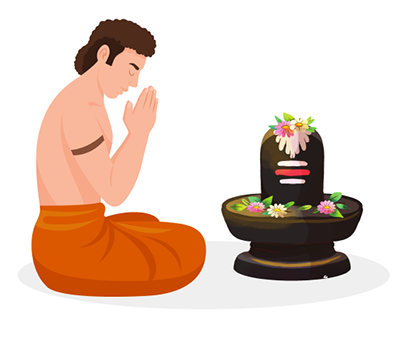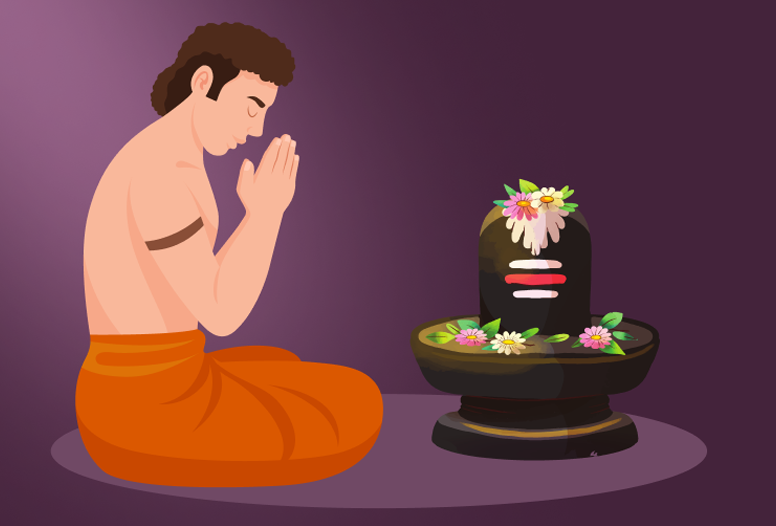Tirth Shradh
In Hindu tradition, honoring ancestors (Pitra Devtas) is a sacred duty, essential for the peace and prosperity of the living. Their contentment ensures harmony in descendants' lives. Tirth Shradh, a spiritually significant ritual, is performed at holy pilgrimage sites (tirthas) to offer prayers and liberation to departed souls, strengthening the ancestral bond and fulfilling sacred obligations.
Puja Packages
About Tirth Shradh

Tirth Shradh is a harmonious union of two profound Hindu concepts: ‘Tirtha,’ signifying a sacred pilgrimage site, and ‘Shradh,’ denoting rituals performed to honor and appease deceased ancestors (Pitra Devtas). This ritual reflects the deep spiritual connection between the living and the departed, fostering a bond that transcends mortal existence.
The practice involves performing Shradh ceremonies at sacred locations (tirthas), believed to hold immense spiritual energy. These places amplify the efficacy of the rituals, ensuring that the souls of ancestors receive greater solace and assistance in their journey toward moksha (liberation from the cycle of rebirth). Tirth Shradh provides a platform for families to express gratitude and fulfill their karmic obligations toward their ancestors, known as Pitra Rin (ancestral debt).
Deeply embedded in Hindu culture, this ritual underscores the principles of respect, devotion, and spiritual purity. It is believed that failing to perform these rites can lead to Pitra Dosha, a karmic imbalance that manifests as obstacles in life. On the other hand, Tirth Shradh invites blessings of peace, prosperity, and familial harmony, ensuring the well-being of present and future generations. This sacred act unites earthly duties with divine aspirations, creating a pathway to spiritual fulfillment.
Benefits of Tirth Shradh
Benefits of Performing Tirth Shradh
1.Helps ancestors attain moksha, freeing them from the cycle of rebirth.
Benefits of Performing Tirth Shradh
Attracts blessings for success, longevity, and spiritual growth for the family
Benefits of Performing Tirth Shradh
4.Completes the karmic obligations toward ancestors, bringing peace and contentment to life.
Procedure of Tirth Shradh

Procedure and Timing of Tirth Shradh
Performing these rites under the guidance of knowledgeable priests at sacred tirthas ensures adherence to traditional customs, amplifying the blessings received by the family.

Procedure and Timing of Tirth Shradh
The most auspicious time to perform Tirth Shradh is during Pitra Paksha, a 15-day period in September-October dedicated to ancestral rituals. Other favorable timings include Amavasya (New Moon Day) and during solar or lunar eclipses, as these times are believed to enhance the ritual's spiritual efficacy.

Procedure and Timing of Tirth Shradh
A sacred fire ritual invoking blessings from deities like Vishnu and Yama, aiding the ancestors' journey toward moksha
Significance of Performing Tirth Shradh on Auspicious tithi
Hindu mythology is replete with stories that emphasize the spiritual and karmic importance of Tirth Shradh. These tales highlight the virtues of fulfilling ancestral duties, offering profound lessons on respect and devotion.
The Legend of Karna: In the Mahabharata, Karna, renowned for his generosity, faced a karmic consequence after his death. Upon reaching the heavens, he was denied food and sustenance because he had not performed Shradh for his ancestors during his lifetime. Realizing this omission, Karna prayed for a remedy. Moved by his plight, the gods permitted him to return to Earth for 15 days to complete the Shradh rituals. This act liberated his ancestors and allowed Karna himself to attain peace, demonstrating the indispensability of honoring one’s Pitru Devtas through Tirth Shradh.
Lord Rama's Pilgrimage: In the Ramayana, Lord Rama, after the demise of his father, King Dasharatha, undertook a pilgrimage to Gaya to perform Tirth Shradh. This act set a divine precedent, sanctifying Gaya as one of the holiest sites for ancestral rituals. Lord Rama’s devotion reinforced the belief that performing Shradh at sacred sites aids the souls of ancestors in attaining liberation.
These narratives underscore the central role of Tirth Shradh in Hindu dharma, teaching that ancestral respect and devotion transcend generations. By performing these rituals, devotees align their lives with divine principles, ensuring harmony, prosperity, and spiritual growth.
References in Ancient Hindu Texts
Tirth Shradh holds a prominent place in ancient Hindu scriptures, where its spiritual significance and benefits are extensively detailed. These texts serve as guiding principles, emphasizing the sacred duty of performing ancestral rituals at holy sites.
Garuda Purana: This revered text provides a comprehensive description of Shradh rituals and their immense spiritual value. It emphasizes that performing Tirth Shradh at sacred pilgrimage sites liberates the souls of ancestors, ensuring their peace and salvation (moksha). The Garuda Purana further states that neglecting these rituals can cause ancestors’ souls to remain restless, impacting the well-being of their descendants.
Vishnu Purana: The Vishnu Purana highlights the manifold spiritual benefits of conducting Shradh at holy tirthas. It asserts that offerings made at these sacred sites amplify the blessings received, paving the way for familial harmony, prosperity, and spiritual growth.
Mahabharata: The Mahabharata discusses the consequences of neglecting ancestral duties through powerful narratives, such as the story of Karna. The text emphasizes that performing ancestral offerings is not merely a ritual but a vital act of devotion and karmic balance.
These scriptures illustrate the sanctity and necessity of Tirth Shradh, presenting it as a profound act of reverence that fulfills karmic obligations, fosters spiritual purity, and strengthens the bond between generations.
Sacred Places for Tirth Shradh
Performing Tirth Shradh at specific holy sites, known as tirthas, is believed to amplify the ritual's spiritual efficacy, ensuring peace and liberation for departed souls. Among the numerous sacred locations in India, the following stand out for their profound significance:
Kashi (Varanasi): Known as the spiritual capital of India, Kashi is revered as the ultimate pilgrimage site for performing Shradh rituals. The sacred ghats along the Ganges River, particularly Manikarnika Ghat, are considered ideal for ancestral rites. It is believed that the divine energy of Kashi ensures the liberation (moksha) of departed souls, making it the most sought-after destination for Tirth Shradh. The city’s spiritual aura and the belief that Lord Shiva personally guides souls to liberation enhance its sanctity.
Gaya (Bihar): Famed for the Vishnupad Temple, Gaya is another significant site for Tirth Shradh. The Ramayana narrates how Lord Rama performed Shradh here for his father, King Dasharatha, sanctifying Gaya as a prime location for ancestral offerings.
Prayagraj (Allahabad): The Triveni Sangam, the confluence of the Ganga, Yamuna, and Saraswati rivers, is considered a highly auspicious site for conducting Shradh rituals. The sacred confluence symbolizes the unity of divine forces, enhancing the spiritual benefits of the rites.
These holy sites are believed to bring peace to the departed souls and blessings of prosperity and harmony to the living descendants.
Procedure and Timing of Tirth Shradh
Tirth Shradh involves a structured set of rituals performed to honor ancestors and ensure their peace and liberation:
1.Pinda Dan: The offering of rice balls mixed with sesame seeds, symbolizing nourishment for the souls of the ancestors.
2.Tarpan: The offering of water mixed with barley and kusha grass, symbolizing gratitude and respect for the departed.
3.Homa (Havan): A sacred fire ritual invoking blessings from deities like Vishnu and Yama, aiding the ancestors' journey toward moksha.
The most auspicious time to perform Tirth Shradh is during Pitra Paksha, a 15-day period in September-October dedicated to ancestral rituals. Other favorable timings include Amavasya (New Moon Day) and during solar or lunar eclipses, as these times are believed to enhance the ritual's spiritual efficacy.
Performing these rites under the guidance of knowledgeable priests at sacred tirthas ensures adherence to traditional customs, amplifying the blessings received by the family.
Book Your Puja in 3 Easy Steps
Choose Your Puja & Package
Browse through a range of personalized puja options based on your needs—health, wealth, relationships, or spiritual growth. Each package is curated with care by priests.

Fill in Your Details
Share the names and gotras of all participants to personalize the puja on your behalf. Provide your address to receive the sacred prasad directly at your doorstep, carrying the divine blessings from Kashi.

Pay & Join the Live Stream
Complete your booking through secure payment options. Sit back, relax, and experience the puja live from the holy city of Kashi—right from the comfort of your home.

Experience Hindu Puja And Sewa With Kashiarchan 
Offer pujas, watch darshan & receive holy prasad at your home from most auspicious temples across India.


We Are Ready To Help
Need Help, Call Our HelpLine
+91-9198898999
Need Help, Email to us














